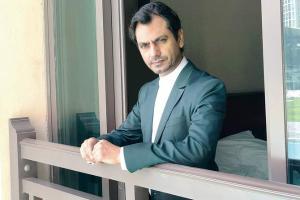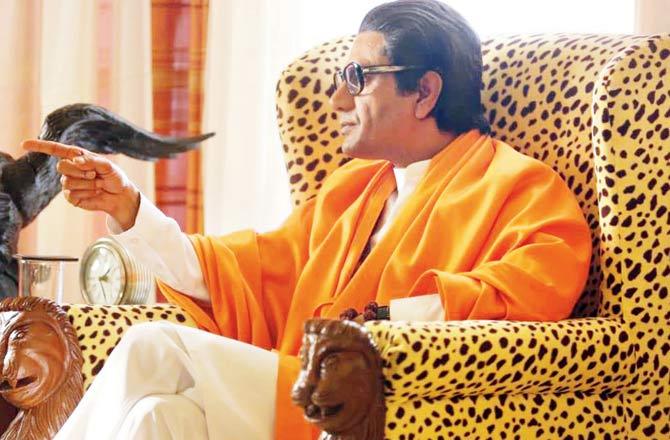Nawazuddin Siddiqui talks about how it's not possible to be outspoken anymore and his trial with the truth, especially as Sadat Hasan Manto

Nawazuddin Siddiqui
It was past 10 pm when we met Nawazuddin Siddiqui at Mehboob Studios. Though he had been at the studio for over 12 hours, there wasn't an inkling of fatigue on his face. "Good films give you the energy to do that extra bit," he joked as we got into his new Mercedes and drove through the bylanes of Bandra. Fresh out of the success of Sacred Games, Nawaz remains unaware of the weight his name carries. He ponders aloud — "Am I a star yet? The day I believe that I will slap myself and say — Dafa ho jaa. I have no right to act anymore if I think that." In a chat with mid-day, he opens up about his film Manto, how the world can't stomach the truth and the many shades of Balasaheb Thackeray he has explored in the much-awaited biopic.
ADVERTISEMENT
Excerpts from the interview:
Is it true you were not keen on doing Sacred Games?
Thank God, I did. It was Vikramaditya [Motwane, showrunner] who called me first because I was not ready to play a gangster again. Vikram insisted on giving me a narration on call and I was blown away by the graph of Gaitonde [his character in Sacred Games]. Anurag [Kashyap] called me and said, "Tu karega toh, main bhi karoonga," and I was in. He wanted to weave a character that was notches above Faisal [Gangs of Wasseypur series]. In my head, Faisal was ultimate. I got on board just to see if there was anything better. While shooting, I got a sense of what he was building the character of a multi-layered man who wasn't all dark. He was vulnerable, volatile, pragmatic and colourful.
After films like Bajrangi Bhaijaan and Raees, why did you take up Manto?
It was a deliberate space change. When it comes to choosing scripts, I can be pretty unpredictable. My next film is with Rajini Sir, but the one after that could be a niche outing like Haraamkhor. Khud ko ulta pulta karne mein mujhe bada maza aata hai. My experiments often fail, but I take those in my stride. I won't go down without trying. I like failing every once in a while, so, I am able to rectify what went wrong.
How did you get into the skin of Sadat Hasan Manto's character?
The beauty of this character is that every method to play him fails. The only formula that worked for me was being brutally honest. I had to bring on the surface everything that society usually forbids me from saying. It's unleashing the unspoken words of one's subconscious mind. Manto is like every one of us if left loose to critique the world around. I was relating to everything I performed and somewhere during the film, Manto and I united in spirit. Manto crept under my skin. After the film wrapped up, I called Nandita [Das, director] to say, 'get this man out of me, he is dangerous'. He is exhausting to be in this synthetic world we live in. Sachai se society
hil jayegi.
Earlier, you could have gotten away with saying things about the world easily than you do now. Do you feel that your fame and stardom requires you to be less outspoken?
(Laughs) It's not possible to be outspoken anymore. I remember watching a video of Robert De Niro at Tony Awards saying 'F#$* Trump'. We haven't created a culture of fearlessness in India. There are only a few who can't be any other way but outspoken. We shouldn't undermine the power and impact of art. Faiz Ahmed Faiz's nazm, Hum Dekhenge became the anthem for the people of Pakistan to overturn the oppressive rule of Zia-Ul-Haq.
Does it hurt that you had to pull back your memoir for saying the truth?
It hurts that I was judged. I was wrong in taking names without thinking how it would affect their lives. I only thought from my point of view. Having said that, I was judged based on five pages of my 209-page-long memoir. The relationships in my life mere made five pages of the whole book, but that was sensational for everyone. No one cared to see my humble beginnings, everything I went through, my training and how I managed to become a credible actor from a background artiste. I wrote it with honesty, it could have inspired a few who aspire to make a name in the movies. Even when I withdrew the book, no one cared to stand up. I don't think of the book anymore. If I ever write again, it would sell because now I am a star, but I won't write the truth ever again. A book full of lies, served by a star, coming up soon!
Is art compromised because of this incessant moral policing?
Hamare yahan sach ko support nahi milta, toh uska dum ghutt raha hai. There is no finesse in our art because we don't give it leeway. In Europe, a filmmaker takes 8-10 years to make a film and when the movie is ready, it's a masterpiece. People finance films easily here and some become a hit; but are we really putting our heart into it or scrounging for quick bucks? People are thriving on mediocrity. Yes, we are better than we were a few decades earlier. I don't have the pressure to bring the audience to the theatre for Manto. I did it to satisfy my greed as an actor. I don't seek satisfaction in reviews or box office; for me, it's discovering myself. Manto feels like an achievement.

On his next project
Siddiqui's next is a biopic based on the life of Balasaheb Thackeray, titled Thackeray. Like the recent biopics that have hit the screen, we wonder if this film will focus on whitewashing on the late politico's image. But Siddiqui says that the film is an artistic expression. "Just because Sanjay Raut is making it, people assume it would be 'whitewashed'. Do people know anything about him? Do they know he started ambulances in the city or built hospitals, got people employment? He was a brilliant cartoonist and an artiste by nature. He was observant and empathetic. One can't question his intention. He inspired people to be enterprising. We have shown his rise till 1995. He wasn't a politician greedy for power; he was about pushing those around him."
Also Read: Finding Manto in the city
Catch up on all the latest entertainment news and gossip here. Also download the new mid-day Android and iOS apps to get latest updates
 Subscribe today by clicking the link and stay updated with the latest news!" Click here!
Subscribe today by clicking the link and stay updated with the latest news!" Click here!






